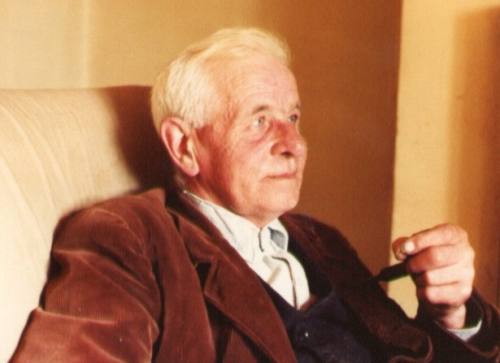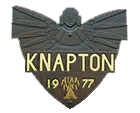Knaptonian – Walter Pardon
Walter William Pardon was born in Knapton on 4th March 1914, in the same red brick farm worker’s cottage that his mother, Emily (Née Gee), was born in 1874, and that he lived in until he died on 9th June 1996 and was buried in Swafield churchyard, having been a carpenter since 1928 when he began work in nearby Paston.
Walter was one of the best singers of traditional folk-song in England and he learned most of his songs from his uncle, Billy Gee (b. 1863), who shared the cottage. Yet outside his family, no one knew of his singing until he was 59 years old.
He was a shy man who did not relish the pub environment, finding it disrespectful to the songs. He preferred a quiet gathering like those he used to have with his family which was rich in singers and musicians (Walter played melodeon) and sometimes seemed rather bemused by the folk clubs and concert halls he found himself in after his “discovery”.

It was in 1974 that he finally came to national prominence in the folk-song world.
Walter’s cousin, a schoolteacher named Roger Dixon, used to hear Walter singing and playing the melodeon when, as a schoolboy, he would visit Walter’s parents. He subsequently gave him a tape-recorder and asked him to record some of the songs for him (some accounts say that Walter refused the gift, but subsequently bought a recorder himself). According to Walter it took him all winter to remember and record about twenty of them. A copy of this tape was then passed on to the revival singer Peter Bellamy, who had once been taught history by Roger, and Peter passed on Walter’s details to Bill Leader, who recorded and issued his first two seminal LP albums.
Walter was subsequently recorded extensively for a number of LPs on the Leader, Topic and Home Made Music labels and appeared in numerous folk-clubs and festivals including the one held at the Smithsonian Institute of Folklife in Washington, DC in 1976 as part of the US Bicentennial celebrations. The folklorist Mike Yates then began a project to record and document Walter’s repertoire of over 150 songs and these recordings from the late 1970s capture a beautiful, gentle singer at the height of his powers.
“He’d either sing them at night, here by the fire, or else, if it was raining and he couldn’t work, we’d sit in the toolshed singing to one another. You see that big drum hanging up there… that was from the Knapton Drum and Fife Band. Uncle Billy played the fiddle with them. We didn’t sing much in the pubs. Uncle Billy had done, in his youth. He picked up some songs in the ‘Mitre Tavern’ in North Walsham. But not me. I only sang at home.”
“Uncle Billy told me that his father used to play the clarinet in the Church Band and that he had the words and music of the songs printed on sheets – broadsides you call ‘em – but I never saw them, not that I can remember. Like you say, a lot of the songs are Irish. Peggy Bawn, The Bonny Bunch of Roses, and I think that when they built the North Walsham to Dilham canal in 1812-1827, that’s when those songs came in around here, brought here by the Irish navvies.”

Uncle Billy Gee

Uncle Walter Gee
“This accordion – I bought it in Norwich ten year ago this summer; sixteen pound, ten. My uncle Walter, he paid ten shilling for his, and that’s just about equal in value, ’cause that’s what his week’s wages were. I still play that, have done for years, in here alone on a Saturday night, never missed. I sometimes sit on the stairs and play, so people can’t hear me. I never bring it out. I’ve never considered myself good enough to bring it out.”
It was only later in life that he appeared in the folk song clubs and then more or less by chance. His style has been developed away from an audience, in the cottage kitchen or in his toolshed on rainy days. In consequence, his singing is thoughtful rather than showy. Perhaps he has always regarded the songs, especially those deepest in musical folklore, more as personal bits of cultural baggage than as entertainment for others.
Listen to three of Walter’s recordings, here on site or on YouTube
The Bold Fisherman
The Trees They Do Grow High
The Devil and the Farmer’s Wife
Walter’s Album covers
Sources and Additional References






